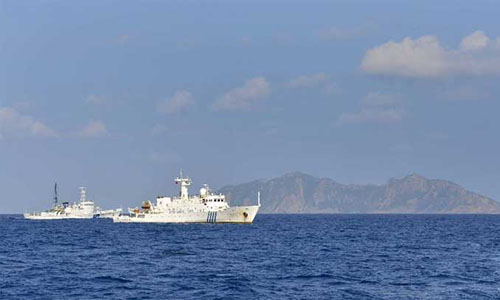
The China Marine Surveillance ships patrol around the Diaoyu Islands, October 25, 2012. Photo: Xinhua
US president-elect Joe Biden on Thursday held a phone conversation with Japanese Prime Minister Yoshihide Suga, covering security issues concerning the Diaoyu Islands, over which Japan has had disputes with China.
Chinese analysts noted that Biden's early involvement in such a sensitive topic, despite that he has not yet taken office, aims to gauge China's reaction and pick up the Obama administration's Asia-Pacific strategy to woo allies in the region to compete with China, while Suga, not long in office, wanted security guarantees from a would-be new leader of its ally.
Observers say that Biden will be tactical in East Asia, adopting a different method from the Trump administration, which will be welcomed by Japan and South Korea. Biden will simultaneously control the security conflicts between China and the US rather than exerting maximum pressure, since he has more urgent domestic problems to deal with, such as the pandemic and the economy.
During the phone conversation, Suga stressed the importance of the Japan-US security alliance, and Biden said the US will "defend" the Diaoyu Islands under their bilateral security treaty, Japanese media reported.
Observers reached by the Global Times all pointed out that it was a reassurance from Biden to Suga that the policy has not changed, but China should make its stance clear and closely monitor the US and Japan's following actions.
"The statement itself was nothing new. Japan just needed to get a guarantee from its ally's new leader, not to mention it wanted to maintain its status in East Asia with the assistance of the US," Li Haidong, a professor at the Institute of International Relations of the China Foreign Affairs University, told the Global Times on Thursday.
The issue of the Diaoyu Islands is one of the most sensitive between China and Japan.
Barack Obama in 2014 stated that the US-Japan security treaty applied to the islands, the first time a US president had clarified the issue, which sparked a strong backlash in China. Obama's statement was made during a visit to Japan after he took office in January 2013. Incumbent President Donald Trump made a similar statement in February 2017 after his inauguration when then Japanese leader Shinzo Abe visited the US.
Biden, however, clarified his position before taking office via the phone conversation.
Given the widely acknowledged understanding that Biden will maintain the China-US competition strategy, his position on the Diaoyu Islands is not surprising. But Biden also has to prioritize more urgent domestic problems, such as epidemic control and economic recovery, Li said.
China's stance is clear that its sovereign and territorial integrity is unquestionable, Li said, warning that the US should not further stir up trouble in the region under the delusion that China will just sit by and watch.
Chinese Foreign Ministry spokesperson Wang Wenbin on Thursday said the Diaoyu Islands are China's inherent territory. US-Japan security treaty, born in the Cold War, must not jeopardize the interests of a third party or threaten regional peace and stability, Wang said at the routine press conference.
Liu Junhong, an expert from the China Institutes of Contemporary International Relations who specializes in Japan issues, told the Global Times on Thursday that Biden's move shows he is coordinating with US allies rather than acting unilaterally. However, both the US and Japan have their own domestic troubles and the possibility of more instigation in the region is low, Liu said.
Biden also held phone talks with South Korean leader Moon Jae-in the same day, discussing their alliance as well as the denuclearization of the peninsula. Moon cited their "70 years of partnership for the protection of shared values" and Biden reaffirmed Washington's firm security commitment to South Korea.
Analysts agree that the US' strategic interest in East Asia has not changed, and Biden will pick up from the Obama administration's Asia-Pacific strategy to woo its allies in the region to contain China's development. But Japan and South Korea, wanting security guarantees, also have concerns over rising military expenses.
Times have changed and China's economic and security capabilities have developed, Liu said, noting that China will defend its core interests but "do not need to react violently to Biden's words."


